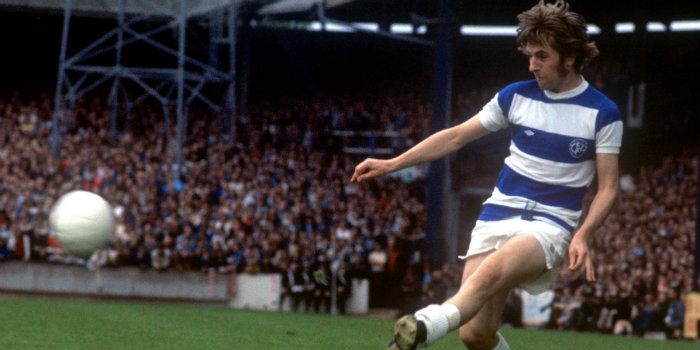Our combined QPR and Nottingham Forest all-time XI
Both have endured some troubled times in recent years, but few clubs can boast all-time XIs as impressive as QPR and Nottingham Forest, who face each other at Loftus Road on Saturday.
Rangers’ famous 1975-76 team, pipped to the post by Liverpool, is widely regarded as one of the best sides not to have won the title.
Winning silverware wasn’t a problem for Forest under the late, great Brian Clough – and the club have produced more outstanding players since winning the European Cup in successive seasons.
Selecting a combined all-time XI is far from easy and many will no doubt disagree with our choice.
Peter Shilton (Forest)
Both clubs have had excellent goalkeepers and Rangers have had two in Phil Parkes and David Seaman. But Shilton, the country’s top keeper for many years, is the obvious choice, particularly as Seaman was not the finished article during his time at Loftus Road.
Viv Anderson (Forest)
England internationals David Bardsley and the late Dave Clement are the two stand-out right-backs of QPR’s history, but Anderson is selected here. A European Cup winner and England regular, he was superb for Forest before moving to Manchester United.
Des Walker (Forest)
Walker was terrific at the peak of his powers in the late 1980s and 1990s. He’s an obvious choice.
Paul Parker (QPR)
Forest fans, many of whom would no doubt expect to see Kenny Burns listed here, might scoff at Parker’s inclusion. But every QPR fan who saw him in his prime can vouch for what an absolutely brilliant centre-back he was – and what a pity it is that beyond west London he is remembered as a right-back, where he mostly played for Manchester United and England.
Stuart Pearce (Forest)
For Clement and Bardsley at right-back, read Ian Gillard, who played for England, and Clive Wilson, who should have done, as QPR’s stand-out left-backs. But of course the Shepherd’s Bush-born Pearce – an R’s fan as a boy – has to be the choice.
Gerry Francis (QPR)
Again, many Forest supporters will allege a definite QPR bias. And while we’re convinced Parker is a must-pick as a centre-back, Reds fans might have a stronger case for questioning our choice of central midfielders. But we think we’ve picked the right ones.
It’s a tough one – especially as we’ve only picked two in order to make room for a third forward and a very special winger. One of our choices is Francis, who was captain of England and Rangers’ superb team of ‘76.
Ray Wilkins (QPR)
European Cup winners Martin O’Neill and John McGovern were outstanding players and of course Forest had Roy Keane too.
Like Keane, Wilkins had his best years at Manchester United, but the former England midfielder had enough left to enjoy a wonderful few years at QPR, where he was the linchpin of a cracking team which finished fifth in the Premier League the season a young Keane was outstanding in a Forest side that were relegated.
Rodney Marsh (QPR)
Rangers legend Marsh put the club on the map and was a genuine superstar in his heyday. One of QPR’s best two players of all time, he has to be included.
John Robertson (Forest)
Dave Thomas was a great winger for QPR in the mid-70s but Robertson – described by Clough as “an artist, the Picasso of our game” – was in a league his own.
Some of our choices might be a bit harsh on Forest legends, but leaving Robertson out really would be taking the biscuit. Of course he’s in.
Stan Bowles (QPR)

Barely on speaking terms with Clough during an unhappy spell at Forest, maverick genius Bowles made his name in west London and is regarded as QPR’s best-ever player.
Les Ferdinand (QPR)
Finally, a number nine. Stan Collymore at his best was magnificent and is fondly remembered by fans of Forest, where Ian Storey-Moore averaged almost a goal every two games during a 10-year spell.
Rangers had a goalscorer of their own in Clive Allen, but Ferdinand is our choice largely because there were so many aspects to his game and for a spell he was one of the country’s best strikers, if not the best.
As well as having searing pace and being unplayable in the air, when he picked the ball up near the halfway line he looked capable of going on and scoring – and in that sense he was pretty unique.
